Posted on October 24, 2025 by Chris Sebastian
The $6,000 Adventure Question: Why Millennials Are Trading Resort Walls for Open Horizons
When a generation spending $6,380 on leisure travel chooses between poolside predictability and ocean adventure, they're not just booking a vacation—they're investing in transformation.
The average millennial will dedicate 35 days to travel this year, allocating 29% of their income toward experiences that matter.1 For the 72% who prioritize experiences over possessions, the decision between a $6,000 resort week and an adventure sailing certification represents something deeper than vacation planning.2 It's about choosing who they want to become.
This isn't about finding the cheapest option. It's about understanding why a generation that collectively spends $200 billion on travel annually increasingly chooses immersive adventures over luxury resorts. And why the science of learning confirms their instincts.3
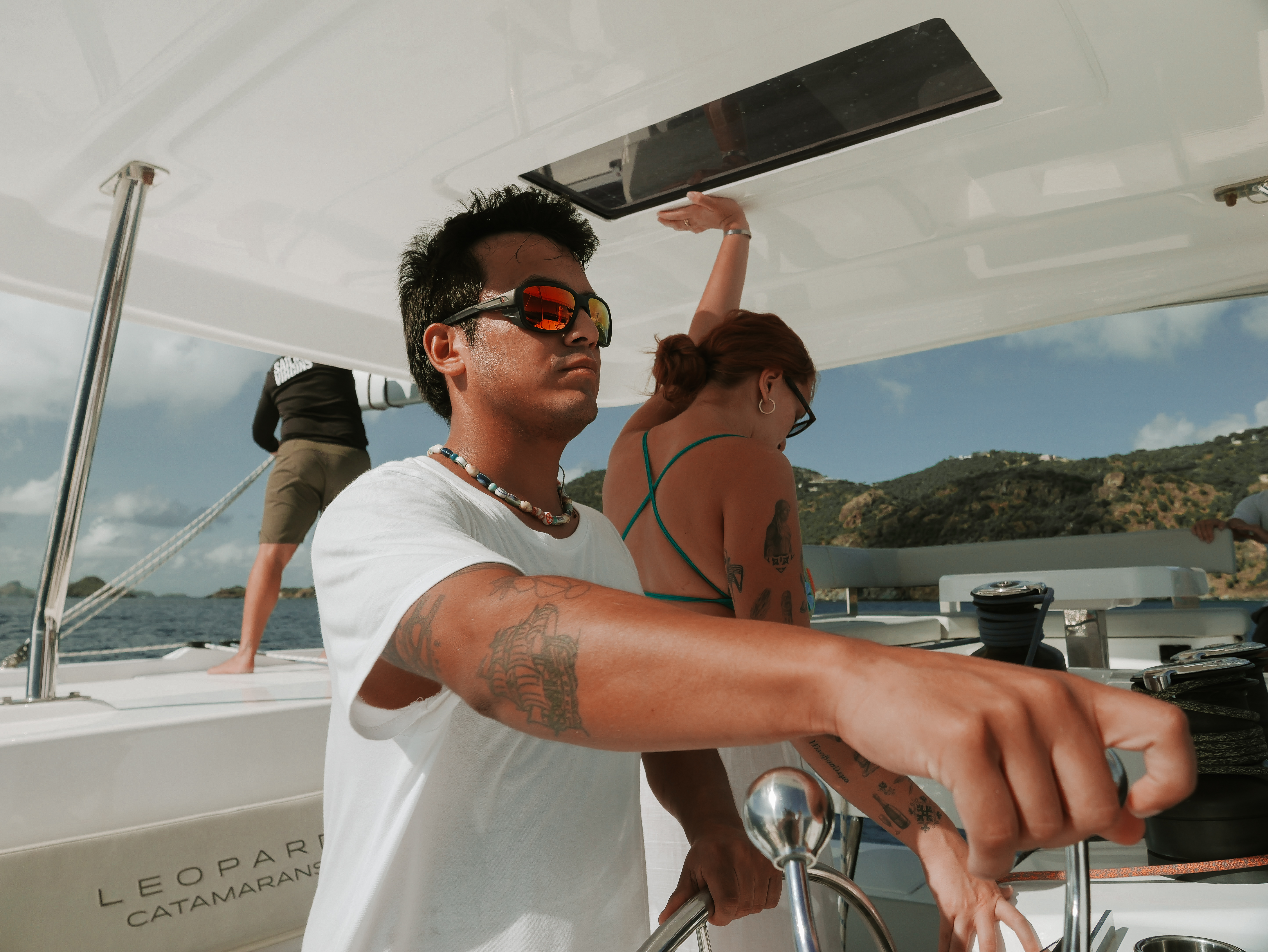
The New Mathematics of Millennial Travel
The typical millennial spent $4,141 per trip in 2024, with plans to increase that to $6,380 for leisure travel in 2025.4 These aren't impulsive purchases - 33% of this group budget over $5,000 annually for vacations, representing deliberate investments in experiences that align with their values.5
For wealthy millennials earning $250,000+, the numbers scale dramatically. This demographic spends approximately $35,000 annually on travel for a family of four, typically including two major trips plus additional getaways.6 They're transforming the travel industry not just through spending power but through fundamentally different expectations about what travel should deliver.
The shift toward adventure is unmistakable: 68% of millennial travelers prefer adventure-based vacations like hiking, diving, or cultural immersion over standard sightseeing tours.7 They're the generation driving adventure tourism's explosive 15-20% annual growth, seeking experiences that challenge, transform, and create stories worth sharing.8
What $6,000 Buys: Four Walls or Forty Islands
A week at a luxury Caribbean resort delivers exactly what the brochure promises. The Four Seasons, Ritz-Carlton, or similar properties provide impeccable service, stunning architecture, and every amenity imaginable. For $6,000-8,000, you'll enjoy world-class restaurants, infinity pools overlooking the ocean, and spa treatments that melt away stress. You'll sleep in the same room each night, eat at the same restaurants, and share facilities with hundreds of other guests seeking identical experiences.
Adventure sailing education – starting at $3,990 for programs like Sailing Virgins – inverts this equation entirely. Instead of one location, you'll explore multiple islands. Instead of viewing the ocean from your balcony, you'll live on it. Instead of scheduled activities, you'll navigate real challenges. Instead of room service, you'll catch fresh tuna at dawn and prepare sashimi on deck. Instead of poolside strangers, you'll forge bonds with four crewmates who become lifelong friends.
The premium programs in exotic locations like French Polynesia, priced at $5,000-6,000, deliver experiences that money literally cannot buy at any resort. Navigating Maupiti's treacherous 200-foot-wide pass requires skill no concierge can arrange. Anchoring alone at uninhabited motus puts you places day-tours cannot reach. Receiving spontaneous invitations to local family dinners creates cultural connections no package includes.
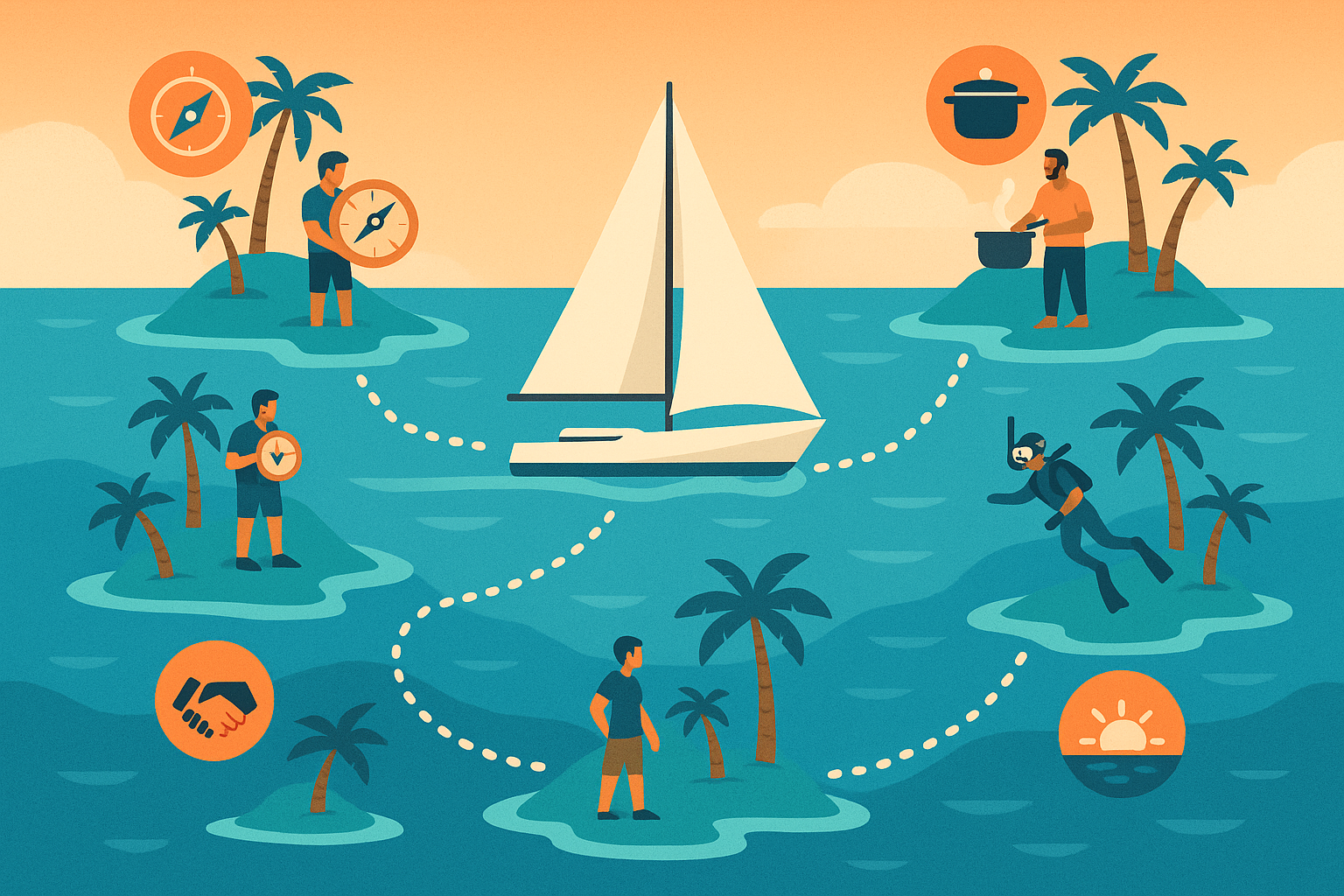
The Science Behind Adventure Learning
Traditional vacation experiences fade quickly. Research on experiential learning reveals why: passive observation yields only 5-10% retention, while hands-on practice delivers 75-90% retention rates.9 When you learn sailing through immersive adventure rather than scheduled lessons, you're literally rewiring your brain for competence rather than just collecting memories.
Novel experiences in challenging environments trigger dopamine release in the hippocampus, enhancing memory consolidation and creating lasting neural pathways.10 Living aboard a sailboat for seven days, navigating new waters daily, and solving real problems with real consequences builds genuine competence that resort activities cannot replicate.
This aligns perfectly with how 86% of millennials travel for experience and culture, with 60% ranking authentic cultural immersion as essential to their travel decisions.11 They understand intuitively what neuroscience confirms: transformation happens through challenge, not comfort.
The Skills Premium of Adventure Education
Adventure sailing develops competencies that extend far beyond nautical knowledge. Leadership emerges naturally when you're responsible for crew safety. Problem-solving accelerates when equipment fails miles from shore. Cultural intelligence deepens through genuine interaction with local communities rather than resort staff trained to meet tourist expectations.
These are the soft skills that 82% of employers now rank as more important than technical knowledge.12 When millennials invest in adventure education, they're simultaneously building résumés and bucket lists. The confidence gained from successfully navigating foreign waters translates directly to professional environments where adaptability and resilience determine success.
Water-based adventures have become particularly popular among millennials, with sailing joining scuba diving, sea kayaking, and marine exploration as preferred activities.13 But sailing uniquely combines physical challenge, technical learning, cultural immersion, and social bonding in ways that isolated adventure activities cannot match.
The Transformation Economy
Millennials aren't just choosing different vacations – they're redefining value itself. With 82% wanting vacations with minimal environmental impact and 56% selecting destinations based on environmental practices, they see sailing's low-impact exploration as aligned with their values.14
This generation takes an average of 35 days of vacation annually, viewing travel not as escape but as essential to identity formation.15 They're the 76% planning solo trips for personal growth, the 84% spending more on travel despite economic uncertainty, and the cohort that moved back home or cut other expenses specifically to fund transformative experiences.16
For wealthy millennials in particular, the choice between resort luxury and adventure education reflects deeper priorities. Boston Consulting Group research reveals that while this demographic has resources for any experience, they consistently choose options that deliver personal growth over passive consumption.17
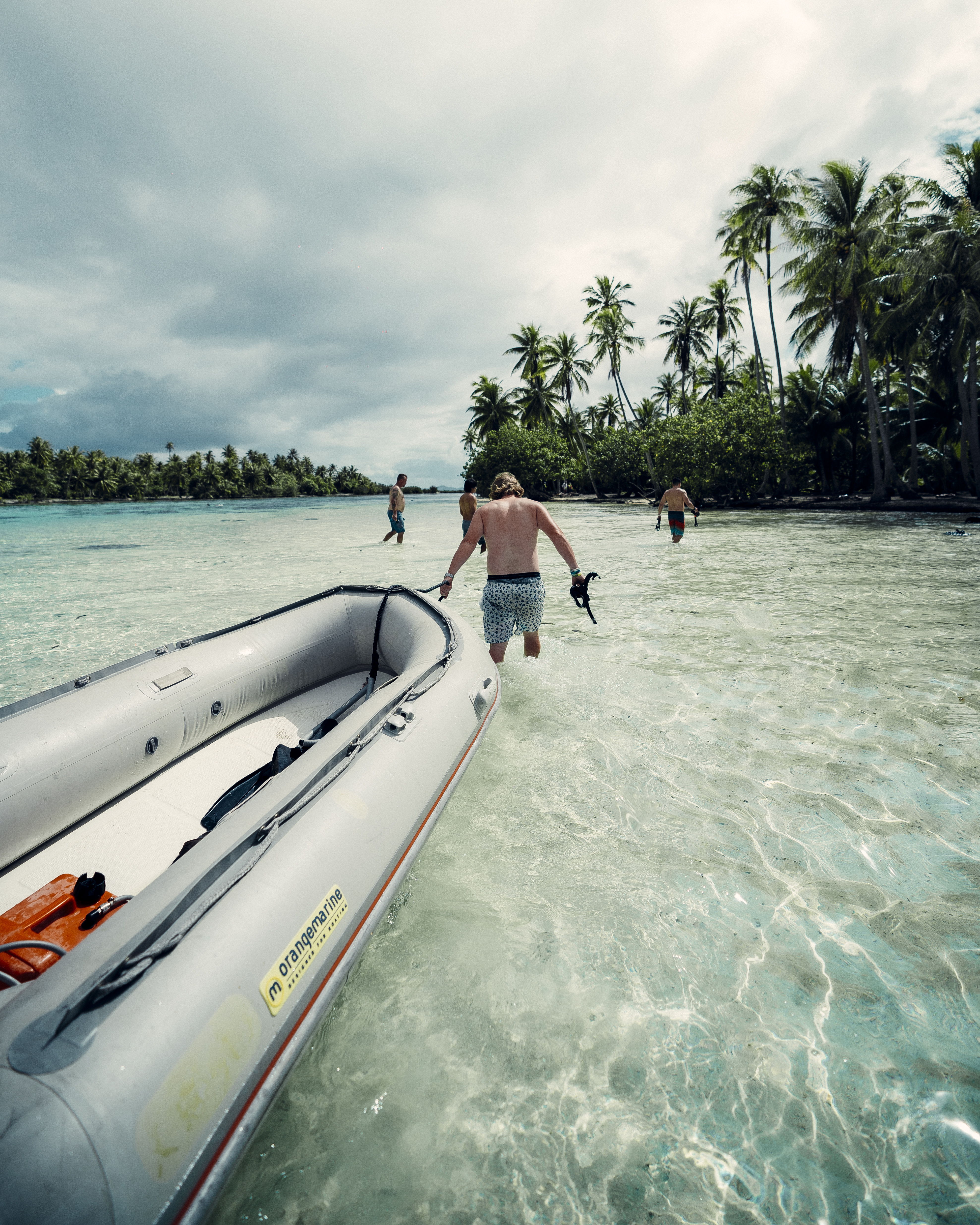
The French Polynesian Paradox
Consider two couples, each spending $9,500 on a luxury week in French Polynesia.
The resort couple wakes to the same mountain view from their overwater bungalow, orders room service, joins a scheduled snorkeling tour with twenty others, returns for spa treatments, and dines at restaurants where menus never surprise. They'll capture beautiful photos from designated viewpoints and return home relaxed but unchanged.
The sailing couple wakes in a different anchorage each morning – sometimes alone at a deserted motu, sometimes in a village harbor where church bells summon locals to Sunday service. They'll navigate passes that require reading currents and winds, provision from markets where nothing has English labels, accept dinner invitations from families they meet at anchor, and swim with dolphins that choose to visit rather than perform on schedule.
Both couples spend similarly. Only one returns genuinely transformed.
{{cta('198179665010','justifycenter')}}
The Community Dividend
Traditional resorts create customers. Adventure sailing programs create communities. The difference matters more than most travelers initially realize.
When you spend a week learning alongside three other adventurers and an instructor who becomes a mentor rather than staff, you forge connections that endure. Alumni networks of adventure sailing schools organize reunions, plan charter trips together, and maintain friendships across continents. The Instagram feeds of these graduates don't just show beautiful destinations; they document ongoing adventures with people who started as strangers and became crew.
This community aspect resonates powerfully with millennials, 60% of whom prioritize authentic connections and cultural immersion over tourist amenities.18 They're seeking what researchers call "transformative travel": experiences that fundamentally shift perspective rather than simply provide respite.
Beyond Certification: The Competence Revolution
A sailing certification from a traditional resort-based school checks boxes. ASA 101, 103, 104 – you've technically qualified. But certification without competence creates dangerous overconfidence.
Adventure sailing programs operating in challenging waters with daily application produce sailors who don't just hold certificates but possess genuine capability. When you've anchored thirty times in varying conditions rather than three times in familiar waters, competence replaces anxiety. When you've provisioned in markets across multiple islands rather than ordered from resort menus, adaptability becomes natural.
This distinction between certification and competence extends beyond sailing. It's why 85% of executives report that experiential learning participants demonstrate superior problem-solving and leadership compared to traditional training graduates.19
The Value Equation Redefined
Value isn't what you pay – it's what you receive divided by what you sacrifice. When adventure sailing delivers:
- Multiple destinations versus one resort
- Genuine skill development versus passive entertainment
- Lasting friendships versus fleeting acquaintances
- Cultural immersion versus tourist bubbles
- Environmental consciousness versus resource consumption
- Personal transformation versus temporary relaxation
The mathematics become clear. Paying $3,990-6,000 for adventure education that transforms perspective, builds competence, creates community, and opens lifelong pursuits delivers exponentially more value than $6,000-8,000 for predictable resort luxury.
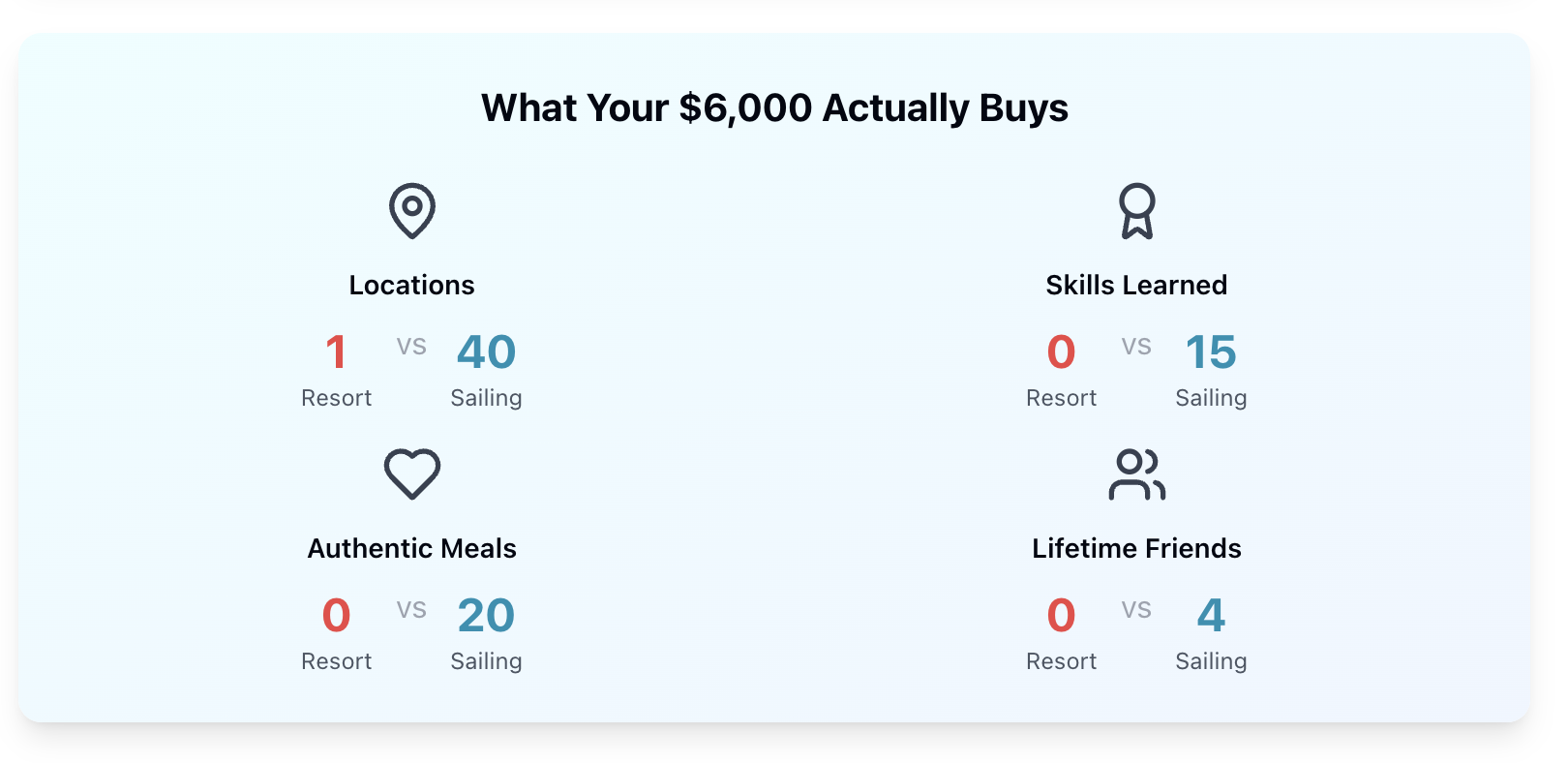
The Investment Perspective
Wealthy millennials earning $250,000+ annually, who allocate 8-14% of income to travel, understand this value equation intuitively.20 They could afford any resort but increasingly choose adventures that challenge rather than coddle. They're investing in experiences that compound: skills that enable future adventures, friendships that create travel partners, confidence that transfers to professional environments.
When 72% of millennials explicitly prefer spending on experiences over possessions, they're making a philosophical statement about value.21 A week at a resort is consumption. A week earning sailing certification while exploring paradise is investment. One depreciates immediately. The other appreciates over time.
The Decision That Defines a Decade
For millennials planning to spend $6,380 on leisure travel in 2025, the choice between resort comfort and adventure education will shape more than vacation memories.22 It's the decision between observing life and living it, between being served and becoming capable, between photographing adventures and having them.
The 68% of millennials who prefer adventure-based vacations aren't just following trends.23 They're recognizing that in a world where experiences define identity, the adventures we choose shape who we become. They're the generation that understands paying less for passive luxury while investing more in active transformation isn't about budget – it's about values.
When you can spend $6,000 anywhere, the question becomes: Do you want to return home with photos or capabilities? Stories or skills? Memories or transformation?
The boats are waiting. The wind is building. The only question is whether you'll watch from the resort balcony or trim the sails yourself.
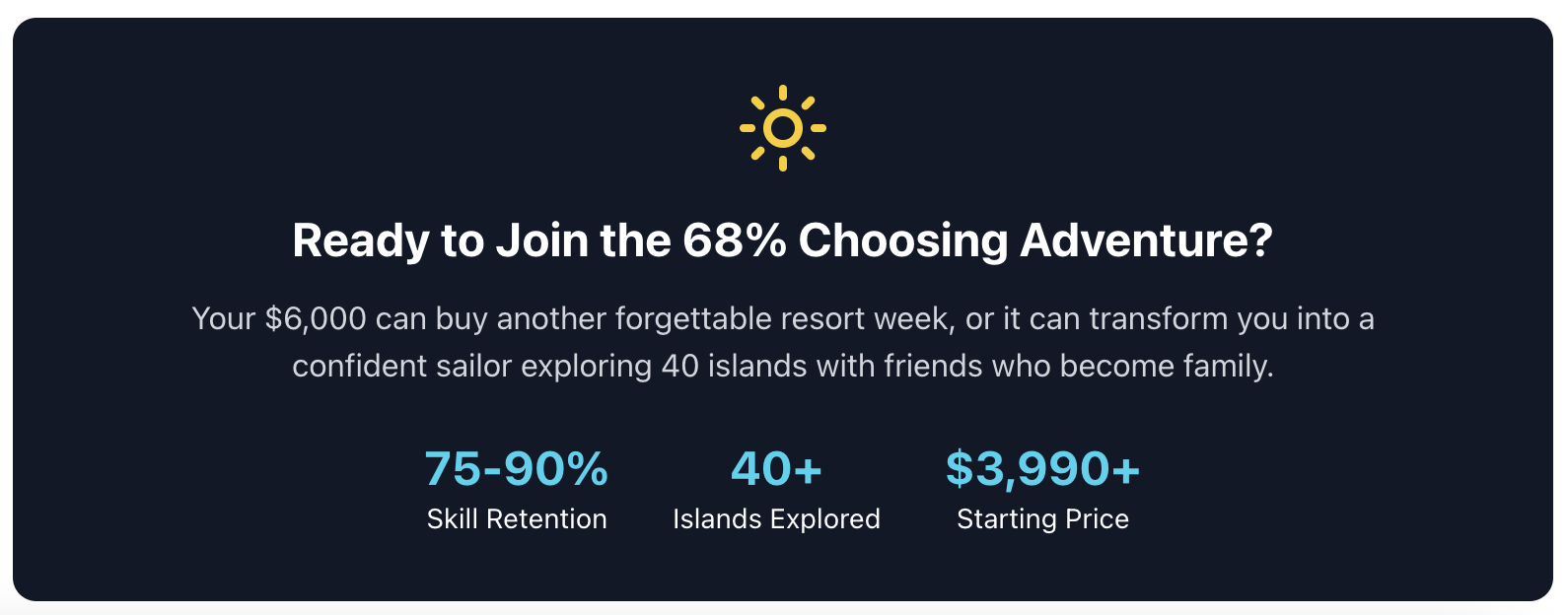
For those ready to transform their $6,380 travel budget into genuine adventure, explore sailing certification programs that deliver competence, not just certificates. Because when 86% of your generation travels for authentic experience and culture, choosing the real thing over the resort version isn't just smart—it's essential.24
References
[1]: Condor Ferries, "60+ Millennial Travel Statistics & Trends (2025)"
[2]: Condor Ferries, "60+ Millennial Travel Statistics & Trends (2025)"
[3]: Condor Ferries, "60+ Millennial Travel Statistics & Trends (2025)"
[4]: Accio, "Travel Trends by Generation" (2024); Condor Ferries (2025)
[5]: HotelAgio, "Millennials Travel Statistics" (2024)
[6]: Yahoo Finance, "Upper Middle Class Spending" (2024)
[7]: Atlas and Wild, "Gen Z and Millennial Travel" (2024)
[8]: Grand View Research, "Adventure Tourism Market Report" (2024)
[9]: National Training Laboratory, "Learning Retention Rates"
[10]: Journal of Neuroscience, "Novelty and Memory Enhancement" (2019)
[11]: Atlys, "Millennial Travel Statistics" (2024)
[12]: LinkedIn Learning, "Workplace Learning Report" (2024)
[13]: Travel Noire, "Adventure Travel for Millennials" (2024)
[14]: Peek Pro, "Millennial Travel Trends" (2024)
[15]: Mize Tech, "Millennials Travel Statistics" (2024)
[16]: Condor Ferries, "60+ Millennial Travel Statistics & Trends" (2025)
[17]: Boston Consulting Group, "The Millennial Mindset" (2024)
[18]: Atlys, "Millennial Travel Statistics" (2024)
[19]: Association for Talent Development, "Experiential Learning Impact" (2023)
[20]: Yahoo Finance, "Upper Middle Class Spending" (2024)
[21]: Condor Ferries, "60+ Millennial Travel Statistics & Trends" (2025)
[22]: Accio, "Travel Trends by Generation" (2024)
[23]: Atlas and Wild, "Gen Z and Millennial Travel" (2024)
[24]: Atlys, "Millennial Travel Statistics" (2024)